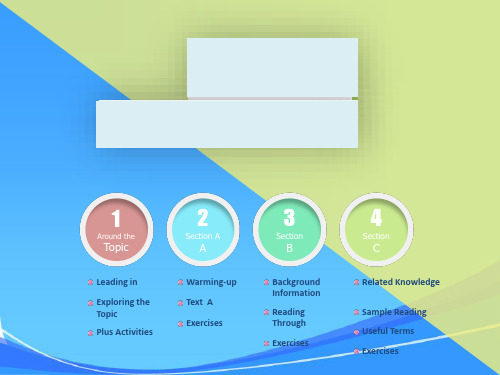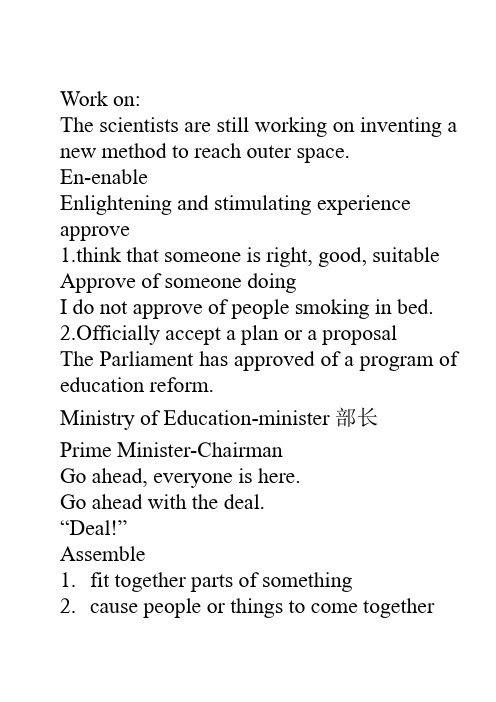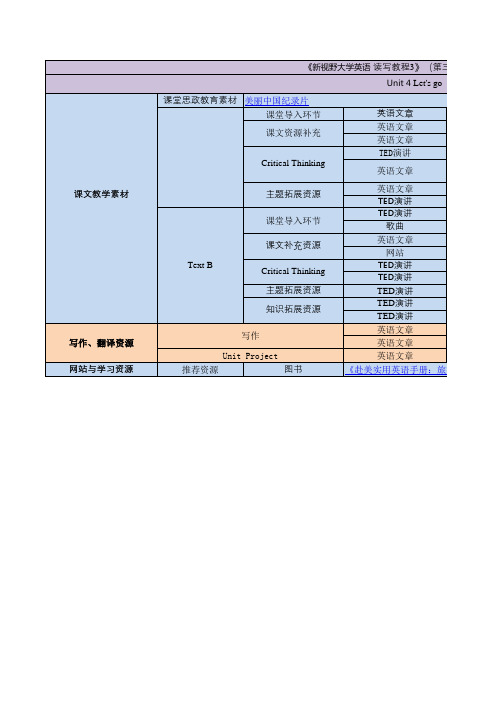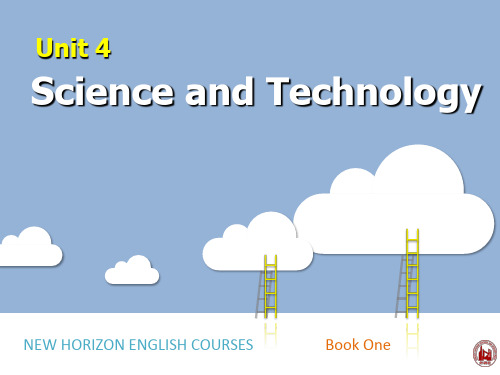小学英语语法新视野 3 Unit 4说课材料
- 格式:ppt
- 大小:1.42 MB
- 文档页数:27

教案New Horizon College English新视线大学英语读写教程读写教程(四)教研室:大学英语教研室教师姓名:课程名称大学英语(4)讲课专业和班级Unit 4 Achieving 讲课学时 6讲课内容sustainableenvironmentalismThe teaching objective of this unit is to help students:grasp the main idea and structure of the text;2. To understand thestructure of “ rebutand organizecounter-arguments”;3. To write an argumentative essay;教课目标4.To master the key language points and grammatical structures in thetext.5.To conduct a series of reading, listening, speaking and writingactivities related to the theme of the text.1. Text structure analysis2. Language points:Key words and expressions : environmentalism, constituent,segregate, consolidate, differentiate, definitive, deplete,教课要点reversible, chord, regime, call upon/on, be incompatible with,either-or, as as the next person/man, choose sth. over sth. else,frame/ state of mind.3. Writing skills: how to rebut and organize counter-arguments教课方法 1. Communicative approach;2. Task-based teaching method;3. Audio-lingual method.1. Pre-reading Activities2. Text Structure Analysis教课过程 3. Detailed Study of the Text4. Grammar and exercises5. Writing and reading skills practiceHomework:作业1. Write a paragraph with the structure of “ rebut and organize counter-arguments ” .2. Recite the appointed paragraph.协助手段Multimedia software, CD-ROM 指导答疑教课内容I. Pre-reading ActivitiesStep 1 : To ask students some questions concerning environment like:What are the pollutions to environment?How to prevent pollution?What to do to make the protection sustainable?Step 2: Discuss in groups.Step 3: Introduce background information.Ⅱ. Text Structure AnalysisAsk the Ss to read the passage as quickly as they can and to get the main idea of each paragraphand make clear about the text structure.Purpose : Improve the students’ reading and writing ability and understand the general idea of each paragraph.Method: Read the text individually and discuss in groups.Part I (paras. 1):I ntroduction to environmental protection.Part II (paras. 2-10): Body: rules on environmental protection.Part III (paras. 11-13): Conclusion: nature should be subordinate to human beings.Ⅲ. Detailed Studies of the TextNew words and expressions 1.constituentn. a) sb. who votes in a particular area.When the vote was announced, all the constituents broke into cheers.当投票结果宣告时,全部的选民都喝彩起来。


Work on:The scientists are still working on inventing a new method to reach outer space.En-enableEnlightening and stimulating experience approve1.think that someone is right, good, suitable Approve of someone doingI do not approve of people smoking in bed.2.Officially accept a plan or a proposalThe Parliament has approved of a program of education reform.Ministry of Education-minister部长Prime Minister-ChairmanGo ahead, everyone is here.Go ahead with the deal.“Deal!”Assemble1.fit together parts of something2.cause people or things to come togetherThe leaders assembled in Shanghai for the meeting.I have assembled all the information I need for my essay.1.Be dedicated=be establishedOfficially hold a ceremony to say that an organization or monument is establishedA memorial stone was dedicated to those who lost their lives in the war.2.give one’s attention or efforts to do sthHe dedicated all his time correcting his students’ papers.3.declare a book, a performance in honor ofsomeone.The singer said he dedicated his first song to his fans.Devoted fansFor sale: be intended to be sold.Come up with: to produce an idea or a solutionScientists have come up with new ways of saving energy.Energy-efficientVersion1.A thing that is based on sth but has some different characteristicsA five-door version of the Ford2. an account of sthThe two newspapers gave different versions of what happened.Universal adj1.involving everyone in the world or in aparticular groupThe rejoicing was universal .A universal agreement =an agreement reached by all2.be true or suitable to all situationsa universal drive programuniversally: in all situations or worldwide rise to fame.The speed that he rose to fame is astonishingly rapid.PeasantSolemn: a solemn statement/promise/facePolitician/StatesmanCapture one’s attention(draw/grasp/attract) Eye-catchingPose for a photographGo against= be opposed to sthYour report might go against your chances of winning the contract .Chance game (gambling, lottery )Liberate=set someone or sth freeLiberate people from povertyFrance was liberated in 1945.Origin1.the situation or place that sth begins to exist The origin of a riverThe origin of the infection is still unknown . 2The country, race or family which someone comes fromShe never forgot her humble origins . Evolve=develop graduallyLanguage is constantly evolving.Fish evolved from prehistoric sea creatures. Evolution n. The Theory of EvolutionRecruit1.get people to join in the armyMany young people were recruited on that day.2.find new people to join a company or anorganizationWe won’t be recruiting again until next year. RacismNaturalismCommunismSocialismFeminismIdealismIndividualismCollectivismLive up to one’s expectationSino-US relationsProfessorAssociate professorDistinguished guests, ladies and gentlemen Distinguish v.The hotel enjoys clean environment and delicious food, but….。

3A 《Unit4 This is my friend》教学设计(Lead in)教学重点:1.能够用英语介绍自己的朋友;2.乐于交友,培养良好的“人与社会”的观念。
教学难点:学生能够灵活使用This is…,He\She is my friend.教学过程:一 .Lead in1.Listen to a song.T:What is the song about?这首歌是关于什么的?Ss:Friends.T:Do you have friend?Who?你有好朋友吗?他是谁?Ss:…2.PracticeT:根据图片,完成句子今天就让我们来学习第四单元《Unit4 This is my friend》(出示课题)二.Presentation1.Think and say:T:大家在图书馆里聊什么?刘涛在讲什么?听录音回答.Ss:This is…,She is my friend.2.Learn new words:T:she 是什么意思?我们来看视频,学习新词汇T:因此我们可以用He,she来介绍自己的朋友3.Think and say:T:接下来这幅图,大家看到了谁?Look at the picture.Who can you see?(预测文本)Ss:Su Yang,Liu TaoT:What are they doing?Ss:Reading books(读书)T:他们怎么和王兵介绍彼此呢?Ss:This is Liu Tao ,he is my friend.This is Su Hai ,she is my friend.4.Practice:T:请大家填上自己朋友的名字,补全对话:This is ,he\She is my friend.T:请站起来向大家介绍一下班级里,谁是你的朋友吧!T:让我们来做游戏吧!请小朋友们闭上眼睛,我会悄悄拍一下我好朋友的肩膀,大家仔细听声音,然后猜猜哪位同学是我的好朋友.游戏练习句型三. Homework画出自己的好朋友,并配上英文介绍教学反思:本节课,学生能够在老师的引导下积极完成老师提出的任务:做游戏,学习单词;学习新句型。


授课题目:Unit 4 The Surprising purpose of travel授课时间:第_____周授课类型:理论课授课时数:____课时教学目的:After finishing this unit, students will be able to:1.To practice speaking skills at a travel agency2.To foster students genre awareness and apply it to reading and writing3.To master the reading skill of looking for thesis statement4.To enable students to write an essay of causes on fixed topics by using a genre-based process-writing approach教学重点和难点:1.To talk about the surprising purpose of travel2.To understand the text fully3.To apply the phrases and patterns4.To master the cause-effect essay writing skill教学方法和手段:Various kinds of teaching methods are used:1.Teaching in class. Explain the profound theoretical knowledge in class;2.Case study. Provide case study during teaching, and make the students to discuss about the case;3.Bilingual and full English teaching;4.Learner-centered approach; situational & communicative method;5.Project-based approach教学内容和过程:Section A The surprising purpose of travelStep One Warming-up Activities 30 minutesI. Write as many words related to travel as you can•Varieties of travel•Means of transportation•Tourist attractions•Entertainment activities•Things to take•Where to stay•Other words about travelII. Lead-in questions:1.Do you like travelling? What are the reasons for you to travel?•To have a change•To experience something new and unfamiliar•To see the world and understand different culture•To marvel at the wonder of great nature•To escape from a boring lifestyle•To have a thorough relaxation•To broaden one’s horizons2.What’s your suggestion to a student who wants to have a trip but doesn’thave enough money for it?•Plan ahead•Find useful information•Travel in group•Go to a less-known place•Pack necessary thingsIII Background knowledge1.Where is Left Bank café? What features does it have?•The Left Bank café is located in the village of Saranac Lake on the Left Bank of the River Seine in Paris. It is a favorite meeting place of great artists, writers, and famous intellectuals since the early 20th century. LBC serves authentic French café-style food, including crêpes and tar tines, as well ascoffee, tea, wines and beers.2.What is Let’s Go? Give more information about it.• A world-renowned travel guide series, researched, written, edited, and run entirely by students at Harvard University.•It is claimed to be “the student travel guide” aimed at readers “both young and young at heart”.•Let’s Go was founded in 1960 and is headquartered in Cambridge, Massachusetts, the US. Office.3. What do you know about Machu Picchu?•An ancient ruined South American city high up in the Andes Mountains in Peru.•It was built by the Incas, a Native American people of South America, in about 1500 AD,•It has a temple of the sun and many other buildings.•It is a popular place for tourists to visit.Step Two Text Study 80 minutesI.Interactive reading of the text1. Reading comprehension1)Why does the author choose the word “burdensome” to describe hisimaginary travel? (Para. 1)2)What does the author mean by “the rest of the journey can feel like a tediousl esson in the ills of modernity? It sucks.”? (Para. 2)3)Suppose travel is troublesome and sometimes even unpleasant, why do wetravel according to the author? (Para. 2-4)4)What kind of travel is truly compulsory? (Para. 4)5)What is the irony when people travel to Paris trying to leave all thosetroubles behind? (Para. 5)6)What is the finding of the research? What does the author wants to prove byreferring to the example? (Para. 6)7)What do we need to do to trigger our creativity? (Para. 8)8)What are the secret cornerstones of creativity of travel?What will happen to usafter travel? (Para. 9)2. Structure of the textPart I Introduction (Paras. 1-4)The author gives us a vivid description of the imaginary travel experience, including how he struggles to get up in the early morning, how he gets to the flight gate after all trouble and how he finally gets stuck in the airport. The author puts forward a question: Why do we travel?Part II Body (Paras. 5-8)The author takes us to rethink the question: what is the real purpose of travel? Besides, she shares her own understanding of the real purpose of travel.Part III Concluding part (Para 9)We travel because we need to, because distance and difference are the secret cornerstones of creativity..3. Summary of the TextTravel is ___________ and sometimes even unpleasant; then what is the driving force behind our travel? We travel because we need to. Sometimes our travel is a ____ because we should attend the business luncheon, because we should celebrate Thanksgiving with our mom. We travel because we want to.Owing to the fact that most travel is _______, we just travel following our heart. Most people travel for the sake of __________, but their mind tends to solve the stubborn ___________ issues while on vacation. What is the real purpose of travel? Travelling to a new place can make us less controlled by familiar cognitive ________ that imprison us. As a result, we can better combine the new with the old, the mundane is ________ from a slightly more abstract perspective.To __________ travelers, multicultural contrast means that they are open to ambiguity and willing to see the world in different ways, thus to expand the ______________ of their “cognitive inputs” as they refuse to __________t heir first answers and initial guesses. Of course, that mental flexibility is a side effect of difference and we know what we did not know in the past, by which we become more open-minded and less _______.Apart from its advantages, travel also has it _________, which make us not take great pleasantness. More often than not, we need a _________ after our vacation. We travel because we need to, because distance and difference are the _____________of creativity. Travel will change our mind to some extent, which inturn can have ________on everything in our life.II. Language Focus: Words and expressions1. Key words:1)groan: (Para.1)vi. make a long low sound, e.g. because you are in pain or unhappy (因痛苦或烦恼等)呻吟,发出哼哼声The old man was groaning with pain.v. speak about sth. in a way that shows you are unhappy 抱怨She sat down beside me and groaned about her working day. 她坐在我身旁,抱怨自己整日辛劳。